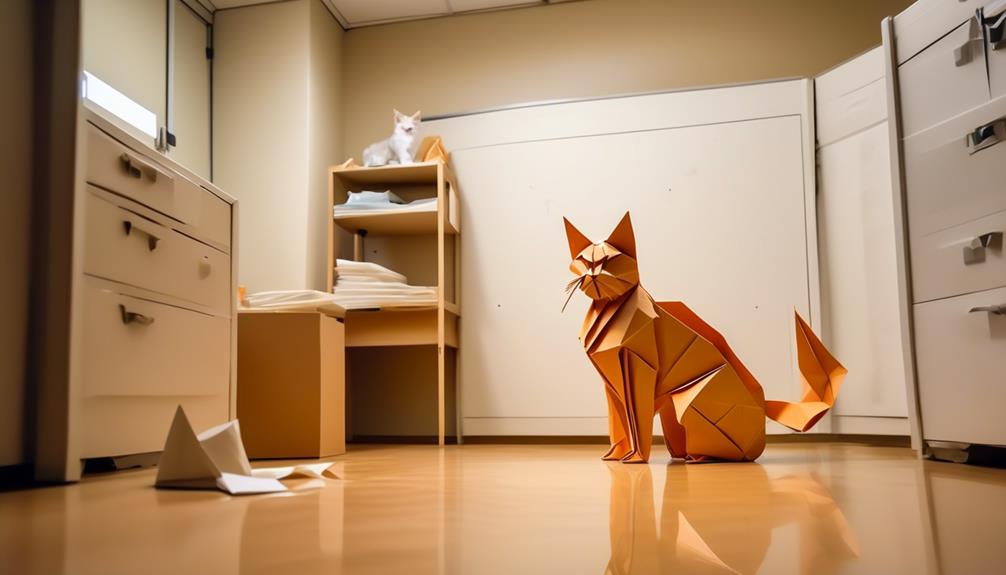Taking care of your senior cat requires careful attention, much like interpreting a valuable but fragile ancient document.
If you’ve noticed your cat struggling to pass urine, it’s essential to realize this isn’t just a drop in the bucket; it’s a serious concern that warrants immediate veterinary attention. Your cat’s comfort and health hinge on your swift actions to address a possible urinary blockage, a condition that can be life-threatening if left untreated.
Let’s go over the first steps you need to take to make sure your older cat gets the necessary care. This includes recognizing early warning signs and knowing how serious the situation is. We’ll guide you through what to expect in this process of healing and prevention.
Key Takeaways
- Recognize the symptoms of urinary blockage in senior cats, such as frequent trips to the litter box with minimal urine production, signs of discomfort during urination, and changes in behavior or appetite.
- Take immediate action by remaining calm, safely transporting the cat to the veterinarian, and avoiding home remedies.
- Veterinary diagnosis procedures may include a medical history and physical examination, blood and urine tests, abdominal X-ray, and ultrasound.
- Treatment options for urinary blockage in elder cats include IV catheter placement, urinary catheterization, medications, monitoring, and diet changes. Long-term management includes special diets, more water intake, stress reduction, and constant monitoring to avoid future blockages.
Recognizing Urinary Blockage Symptoms
When your senior cat begins taking frequent trips to the litter box yet produces little to no urine, it’s a clear sign that they may be suffering from urinary blockage. This alarming condition, also known as urethral obstruction, demands your immediate attention and understanding of the symptoms of cat urinary issues.
You’ll notice that your cat is trying to urinate often with minimal success, which is distressing both for you and your cat. Don’t overlook signs of discomfort or sounds of vocalization when they attempt to relieve themselves; these are cries for help. Blocked cats may also exhibit symptoms of depression, a decrease in appetite, or even vomiting—all indicative of their distress and pain.
Keep an eye out for any unusual behavior. Is your cat urinating outside the litter box, showing lethargy, or excessively grooming their genital area? These could all be signs that your cat is in trouble. Changes in behavior, like hiding or avoiding affection, further emphasize the gravity of the situation.
Your priority should be to provide emergency treatment for your cat. Cat urinary blockage isn’t just uncomfortable; it’s a life-threatening emergency that requires your swift action and compassionate care.
Immediate Actions for Blockage
If your senior cat is showing signs of urinary blockage, you must act promptly and contact a veterinarian for immediate assistance. Urinary obstruction, particularly urethral blockage, is a concerning condition that can lead to acute kidney failure if not treated quickly. Your beloved pet’s health and comfort are at stake, and a compassionate, detail-oriented approach is important.
Once you’re in touch with a professional, they’ll guide you on how to proceed before you can get to the veterinary clinic. Here are immediate steps to take:
- Remain Calm: Your cat can sense your anxiety, so stay composed to help keep them calm.
- Transport Safely: Use a carrier and make the ride as smooth as possible to avoid additional stress.
- Avoid Home Remedies: Don’t try to treat or diagnose the issue at home; leave it to the experts.
- Withhold Food: A veterinarian may need to perform procedures that require an empty stomach, like sedation or anesthesia.
- Comfort is Key: Offer a soft blanket and gentle reassurance while you prepare to leave.
Once at the clinic, the veterinarian may insert a urinary catheter to relieve the urethral obstruction and provide pain medications. Your swift action can be lifesaving for your senior cat.
Veterinary Diagnosis Procedures
Upon arriving at the veterinary clinic, your cat will undergo a series of diagnostic procedures to pinpoint the cause of their urinary blockage, starting with a comprehensive medical history and a meticulous physical examination. The team, often trained at a College of Veterinary Medicine, will look for signs of feline lower urinary tract disease (FLUTD) and check for any urethral plugs or stones that could be causing the urethral obstruction.
To support the physical examination, your vet will likely perform blood and urine tests. These tests are important for assessing kidney values and overall health. An abdominal X-ray or ultrasound might be necessary to visualize the presence of urinary stones or other anomalies within the bladder or urethra.
Here’s a brief overview of the diagnostic tools your vet may use:
| Diagnostic Tool | Purpose |
|---|---|
| Physical Examination | Checks for signs of FLUTD and obstructions |
| Blood and Urine Tests | Evaluates kidney function and detects infection |
| Abdominal X-ray | Identifies urinary stones, masses, or structural abnormalities |
| Ultrasound | Provides detailed imagery of the urinary tract |
Treatment Options Available
Recognizing the urgency, your vet will immediately hospitalize your senior cat to initiate emergency treatment for their urinary blockage. This condition, known as a urethral obstruction, is life-threatening and requires prompt veterinary care to ensure the best outcome for your beloved cat.
Here’s what you can expect in terms of treatment:
- Placement of an IV catheter: This is essential for hydration and administering medications to help manage pain and inflammation.
- Sedation and urinary catheterization: To relieve the obstruction, your cat will be sedated, and a urinary catheter will be carefully placed to empty the bladder.
- Prescription medications: Your vet will prescribe antibiotics to prevent infection, pain medicine for comfort, and medications to relax urethral spasms.
- Monitoring and supportive care: While the catheter is in place, your cat will be closely monitored to ensure proper healing and to manage any complications.
- Dietary changes: A Prescription Diet may be recommended to dissolve urinary crystals and prevent future blockages.
In severe cases where obstructions recur, your vet might discuss the option of Perineal urethrostomy (PU surgery), a more permanent solution to prevent future urethral obstructions.
Long-Term Management Strategies
After addressing the immediate crisis with veterinary treatment, it’s essential to focus on long-term management strategies to prevent future urinary blockages in your senior cat. Urethral obstruction is a serious condition, and your vigilance can help maintain your cat’s urinary tract health.
Tailor your cat’s diet with specialized urinary formulas that prevent crystal formation and support a healthy urine pH balance. These diets are crafted to reduce the risk of small urinary stones that can lead to blockages.
Increased water consumption is important. Ensure fresh water is available at all times, and consider using water fountains or adding flavored water to entice your cat to drink more. This step helps increase urine production, flushing the system and reducing the chances of kidney failure.
Switching to canned food from dry food can improve hydration because it has more moisture.
Monitoring and reducing stress factors in your cat’s environment is key as stress can exacerbate urinary issues.
Frequently Asked Questions
How Long Can a Cat Survive With a Urinary Blockage?
You’re dealing with a serious issue; a cat can only survive with a urinary blockage for 3-6 days. You must act quickly and get them to a vet immediately for lifesaving treatment.
How Painful Is a Urinary Blockage in Cats?
Urinary blockage in cats is like a silent storm brewing, causing severe pain. You’ll want to gently support them by ensuring prompt veterinary intervention to relieve their agony and safeguard their health.
How Much Does It Cost to Unblock a Cat’s Bladder?
You’re facing a range of 300 to 3,000 to unblock your cat’s bladder, with initial treatment costs hitting up to $1,500. Prepare for possible additional expenses from follow-up care and medications.
Is an Emergency When a Cat’s Urinary Tract Becomes Blocked?
Yes, if your cat’s urinary tract is blocked, it’s an emergency. Act quickly and consult a vet; this condition can be fatal. Your swift response could save your cat’s life.




